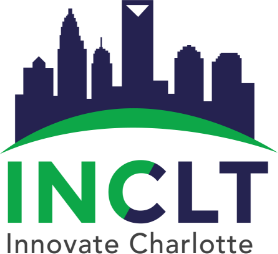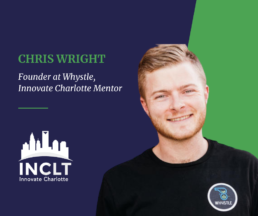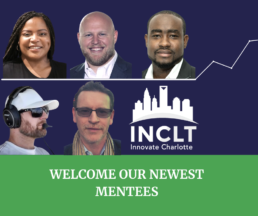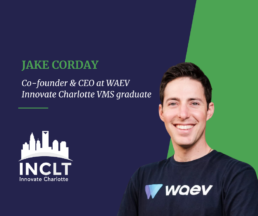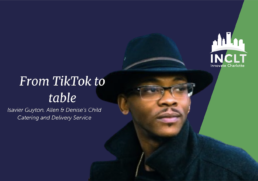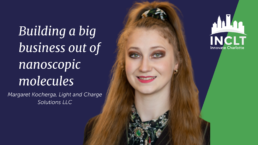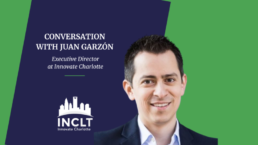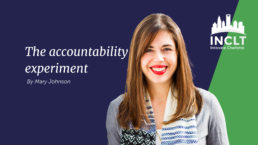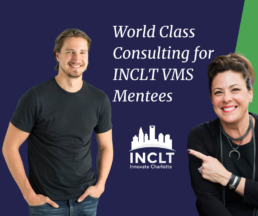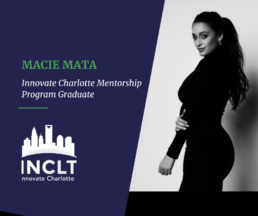The evolution of Whystle
When Chris Wright started looking into launching a business, he had no idea what he would be doing — and certainly no clue that he would use his business to help slow the spread of disease during a global pandemic.But sometimes, that’s how it goes when you’re starting a business. You don’t always begin with a defined vision. Instead, the vision finds you. For Wright, it took the form of the on-demand apartment and home cleaning app Whystle, which was acquired earlier this year.
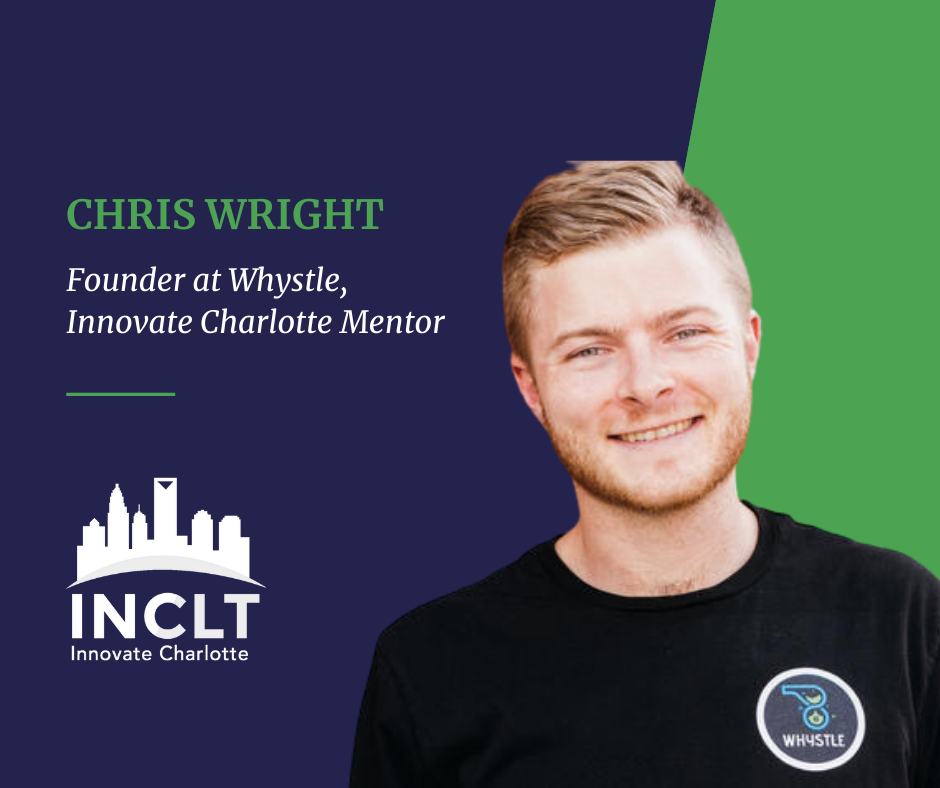
Whystle’s beginnings
Wright had been working as a consultant for Deloitte for several years when he began looking for an opportunity to leave consulting and start a company of his own.“I loved what I did and I got exposed to a lot of things, but I was looking for a way out,” Wright said. “I brought 1,000 different ideas to my then girlfriend, now wife. Her response was usually ‘do more research’ or ‘that's a terrible idea.’” He knew he wanted to build a business around technology. This, coupled with the desperate need to have his own home cleaned, led to the initial ideas for Whystle.
“I was traveling Monday through Thursday, and my wife was working 60 to 70 hours a week,” Wright said. “She would grab my arm after picking me up from the airport and say, ‘I'm sorry.’ We'd get in the apartment, and it was a disaster. I only had 72 hours at home, and I didn't want to spend it cleaning.”
His search for cleaners was disastrous. Several companies turned out to be scams. Several more canceled multiple times, and many would take days to schedule. It was then that he knew there could be a better way, and he could be the one to offer it. “I saw a gap in the market. I knew there were a lot of apartment complexes in Charlotte and a lot of busy professionals who would pay for cleaning,” he said.
When his cleaning business began, Wright focused primarily on millennials who were renting apartments. This evolved into cleaning single family homes and Airbnb properties. In December of 2018, he launched his website, and by March of 2019, he left the consulting world to focus on Whystle full time. In the beginning, Wright had some difficulty finding customers, so he began hosting events at apartments to create a stronger client base. He knew there was more to learn about business ownership, and in the fourth quarter of 2019, he applied to the INCLT Venture Mentoring Service.
How Innovate Charlotte helped
During Wright’s first meeting with a mentor, it became apparent that he had a lot to learn — and unlearn. “I've had to unlearn a lot of habits from consulting,” Wright said. “I can talk for an hour and a half without asking questions. My mentor team was really impressed at first because I looked organized, but I wasn't asking any questions, I wasn't getting the mentorship component.” As time went on, Wright began to realize that the more he put into the program, the more he could get out of it.
“Around the second or third meeting, I started to be really honest with the team and be a bit more transparent and open,” he said. “I got way more impact. There were resources they could provide, ideas they could throw out based on past experience. That's where it really started to kick in.”
The two biggest things Wright took from the meetings were accountability and organization. Having a team to bounce ideas off and to help set and meet goals moved Whystle forward. Wright’s idea began to see 10% growth month over month until Whystle’s biggest month, March of 2020. His team grew to 30 people and work kept coming. However, when the calendar turned to April, the looming COVID-19 pandemic threatened to bring the entire thing to a close. "Almost overnight, 75% of our customer base dropped off,” Wright said. “We went from having our highest month to being back to where we were in quarter three in 2019. We jumped back six to eight months and had built up expenses to scale.”
The COVID pivot
The coronavirus crash could have meant the end of Whystle. Instead, Wright turned it into an opportunity to evolve the business while also keeping people safe. “We realized there was a significant need for small, medium and large business disinfection services,'' Wright said. “We had the knowledge and expertise. We knew how chemicals worked and how to apply them, and we had the team in place. So, we started going around and helping businesses in this capacity.”
Wright said cleaning was still the core service offering, but the stakes were higher. He began focusing on education about the virus and how to properly disinfect, to avoid falling into the category of businesses who were simply trying to make a profit off of people’s fears.“I'd rather everyone be safe than for me to capitalize on this event,” Wright said.
It wasn’t long before Wright made the decision to cancel residential accounts and shift the business entirely into a commercial disinfecting service. “We pivoted into commercial disinfection and janitorial services,” Wright said. “We landed a couple of large contracts, one with a major distribution center. We were there 24/7.” These accounts, paired with grants and a PPE loan, ultimately saved Whystle.
The company doubled down on commercial accounts in late summer of 2020 and hired a commercial operations manager. Residential services also resumed, and by December, the startup had grown almost to the level of income it had seen in March. Then, in January of 2021, Wright was approached by someone interested in buying Whystle.
What’s next for Wright?
In February 2021, Whystle announced it had been acquired by an anonymous buyer. Wright called this a “team decision,” and it is not one that was made lightly. When the initial offer was made, Wright began to ask advice from the people in his network, many of whom were also interested in making an offer for the business, which resulted in a kind of bidding war. Wright said he leaned heavily on his INCLT mentors when it came to making a decision.
“At the end of the day, if you're letting go of your baby, there is an element of wanting to make sure it goes into good hands and that everyone involved is taken care of,” he said. Wright decided to sell but remains a part of the team in an advisory role. He still sees himself as the father of the company.
“Chris is Whystle, and Whystle is Chris,” he said. “So, there is a bit of identity tearing if you're no longer technically a founder and you're no longer running this startup that is now in someone else's hands. Now I have to sit back and not say anything. They're doing it differently than I would and there's nothing wrong with that.” Wright believes he will eventually start another business and also plans to use the lessons he learned along the way to help others, beginning with his new role as an INCLT mentor.
“I made every mistake you possibly could, and that's OK. I can teach others from the mistakes I made,” Wright said. “I'm a firm believer that when you stop learning and growing, that's when you stagnate. I always think there are things people can teach you. There is always something to learn from every single person.”
“It's an amazing story” said Olga Muller, CEO at Kepler Team. "I'm excited to see one of our senior leaders, Olga Ryzhikova, join Innovate Charlotte as a mentor to help support founders like Chris", she continued.
Are you interested in becoming an INCLT mentor — or mentee? Apply today!
Meet the Newest INCLT VMS Cohort Members
“A mentor is someone who sees more talent and ability within you than you see in yourself and helps bring it out of you.” — Bob Proctor
The path of entrepreneurship is many things: exciting, inspiring, and all around breathtaking. But with many peaks comes many valleys. Venturing out on your own, taking an idea from concept through the design phase, and then launching it for all of the world to see can be nothing short of terrifying. Having a community of individuals who have experienced the joys and challenges of the entrepreneurial expedition is a priceless resource, which is why Innovate Charlotte has set out to connect members of the community at every stage of their journey.
Since launching in June 2018, the Venture Mentoring program offers participants an opportunity to undergo group mentoring as they move through the various stages of the entrepreneurial journey. Based on the MIT Venture Mentoring Service (VMS) offers a fluid structure that makes it easier for both mentors and founders to meet and collaborate over an indeterminable period of time.
Let’s meet the latest INCLT Venture Mentoring cohort. 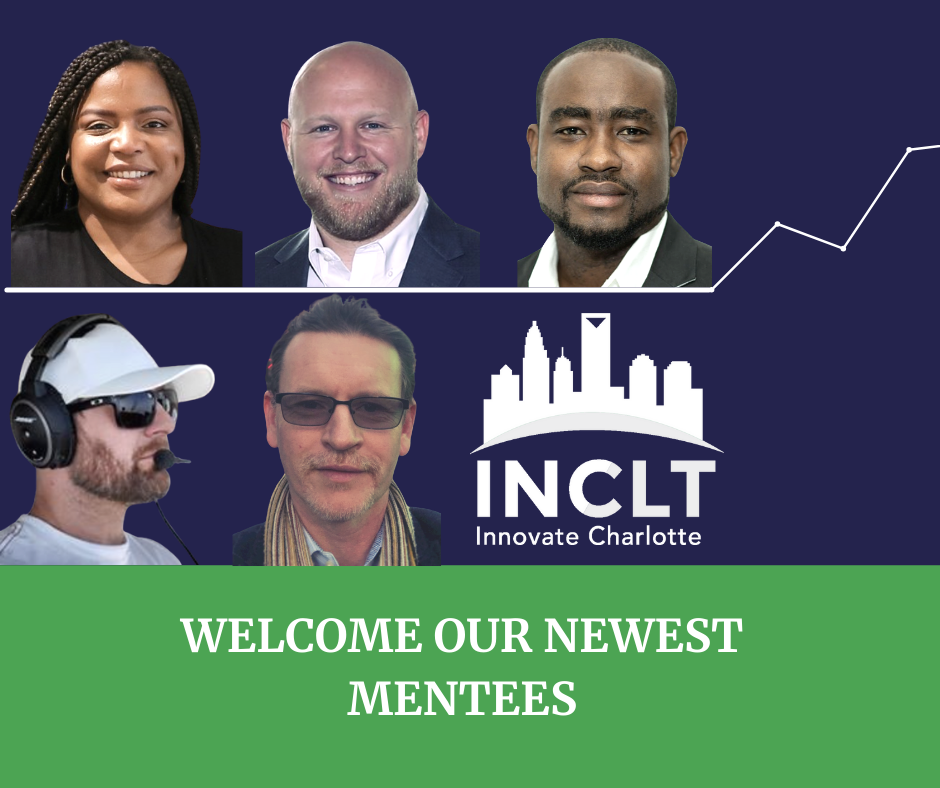
Bart Cant, Founder & Managing Partner of Rethink Ledgers
As a consultant with more than twenty years of experience in the Financial Services industry, Bart Cant it wasn’t until he was introduced to Bitcoin that his focus on Blockchain Technology quickly took off. After becoming the Blockchain Lead for Capgemini in 2014, he joined IBM to co-lead their Bitcoin Consulting Business just three years later, which quickly grew to be the number one rated Blockchain Services Business throughout North America.
In 2019, Cant launched Rethink Ledgers, an advisory, consulting, and development firm that specializes in Blockchain, Distributed Ledger Technology (DLT), and Centralized Ledgers. But starting a business in late 2019 brought on its own, unique challenges. “Shortly after I started Rethink Ledgers, COVID-19 happened,” says Cant, “And I realized that banks would be scaling down on testing and learning about newer technologies due to the uncertainty of the situation at the time.”
Rethink Ledgers focuses on all aspects of business strategy and technology, from the seed of an idea through its final development stages at launch. “In light of the circumstances, I decided to explore new opportunities in the healthcare sector and quickly realized that this industry has just as many — if not more — opportunities to leverage new technologies as the financial sector,” Cant explains. This realization has allowed Rethink Ledgers to recently open its first international office in Pune, India, which will help to serve its larger financial and healthcare clientele in addition to smaller fintech and heathtech startups.
When asked what he looks forward to most about the INCLT VMS program, Cant shares, “I look forward to not only gaining insights from the team of members but also from the larger startup community in Charlotte. I think Charlotte can become a real innovation hub in a few sectors like Financial Services and Healthcare, and I am looking forward to becoming a part of that community — and contributing to it.”
Justin Dues, Founder & CEO of Prohuman Technologies
Described as an inventor, envelope pusher, avid reader and learner of all things, Justin Dues is a serial entrepreneur, offering a proven track record in technical leadership within public, private, and military settings. As a Marine Non-Commissioned Officer, Dues served for nine years, leading teams ranging anywhere from two to 45 members, and deploying to countries all across the world. These experiences honed his leadership skills, sharpening his understanding of basic human motivations that can lead to success across a variety of complex situations.
After active duty, Dues served as the Interim CEO of a family-owned manufacturing business, quickly tripling both the company’s revenue and workforce in just three years. This experience, coupled with his personal encounter with post-service pain inspired the start of Prohuman Technologies, a breakthrough pain management wearable that provides pain relief and optimal recovery.
“By applying a customizable temperature therapy — all thanks to electromedical technology — Prohuman Technologies provides therapeutic pain relief when, how, and where customers need it,” Dues explains.
The device can be heated up to 116 °F and cools to 36 °F, offers self-selected timing cycles, and combines novel passive and active compression at the point of care. They are also designed for long-term use and acts as a mobile solution that doesn’t come with a laundry list of frightening side effects. “It’s a NASA spin-out technology that we are repurposing to provide pain relief and optimal recovery for our customers,” says Dues.
Collaboration and shared learning are two elements that Dues has always felt as important to his life, particularly with those who operate in different industries or come from different backgrounds, as it tends to generate a more diverse set of possibilities. “While serving in the Marines, we learned early to seek out continuous improvement and I think mentorship is an avenue that will help me to prioritize and execute on the actions that are best suited to reach our next goal,” Dues shares.
So, what two things is this founder looking forward to most about the INCLT VMS program? “The random moments of collision when a group of people generate something new — whether that be an idea, process, product, or action — it’s something that will add value to both the company and also to the individuals who are in collaboration. I’m also looking forward to the wisdom I will gain from working with other professionals who all know something I don’t!”
Nicole Hawthorne, Founder of Jayla’s Heirlooms
Every child deserves a doll that looks like they do, which is what inspired Nicole Hawthorne to co-found Jayla’s Heirlooms with her four-year-old daughter, Jayla. “This passion project took on a real meaning for us when we realized the lack of diversity, equity, and inclusion available in the toy market,” says Hawthorne, “Now, we desire to be a brand that not only looks like those who they are attempting to represent, but also one who authentically desires for a variety of other underserved cultures to have a chance to be represented as well — there’s room at the table for all of us to share our rich heritage with the world.”
As an agile project manager by trade, Hawthorne has worked with several startups in recent years, paving the way for the creation of a brand that can resonate with other parents and children of color who have similar experiences in a lack of representation when it comes to the toys available on the market. But the mission goes even deeper: Jayla’s Heirlooms is committed to sustainable sourcing of goods, fair wages, the utilization of women-owned or managed workshops, and the overall ethical treatment of others.
Hawthorne explains, “This is something that takes time and needs to be vetted carefully in order to ensure our higher standards of production and workforce treatment are always being met, which can be highly challenging as far as international logistics and supply chain diversification goes.”
Hawthorne is excited to join the INCLT VMS program, particularly because it means she will have a community around her, rooting for her success at every step of the startup journey. “I cannot wait to grow and learn from people who are interested in what Jayla’s Heirlooms is doing,” says Hawthorne, “We need the good, the bad, and the ugly as entrepreneurs because we’re often dreamers and can see things through rose-colored glasses at times — I can’t wait for people to tell me like it is and guide me along the way.”
Brian Iversen, CEO of Vertical Solar
Solar energy has steadily gained popularity across the United States, moving away from large, solar powered fields, and allowing the flexibility of use right in our own backyards. It’s mobile and can be used just about anywhere for a wide range of purposes: hoisted on a pole for apartment renters or moved from home to home as its owners do. And it’s often far more attainable to invest in solar power than originally thought you can even finance solar power panels much like you would a vehicle loan.
Deconstructing these older, preconceived notions around solar energy is a passion for Brian Iversen, which is why he launched Vertical Solar LLC, a company that offers turn-key solar powered systems, such as solar power on a pole. By locating solar power right where the load is, no transmission lines are needed!
As the former Chief Operating Officer with a solar panel manufacturer that made over 90% of the United States military solar panels — panels that are lightweight and can withstand being fired upon with interruption — Iversen is dedicated to educating customers about this particular energy solution. “Since we are so innovative in vertical solar power, we have to provide the customer with an education before we can even begin to show them how it can satisfy their needs,” Iversen says.
But starting a business is no small feat, particularly in light of recent world events such as the pandemic. “I was inspired to seek mentorship with INCLT by others who have started businesses and faced similar challenges that we are facing today,” shares Iversen, “After all, we know what we know and need to know more!”
Greg Safko, Founder & CEO of Rogue Learning
As Nelson Mandela once said, “Education is the most powerful weapon which you can use to change the world.”
That’s exactly what Greg Safko, founder, and CEO of Rogue Learning, intends for his business to do. Using modern instructional-design theory, Rogue Learning is helping manufacturers to educate the world on how their products work and apply the benefits to their everyday lives.
After spending the last fifteen years heavily involved in every aspect of retail product education, Safko has been instrumental in creating and implementing national training programs for automotive manufacturers, launching more than thirty new vehicles to their dealership networks.
With the introduction of COVID-19, Safko made the decision to create his own agency, Rogue Learning, leveraging the latest technology to broader the reach and scope of manufacturer-based training programs. Safko explains, “I hope to make the old-world models of in-person training a thing of the past by utilizing technology in order to reach more brands in an effective, efficient way.”
Since launching, Rogue Learning has already witnessed just how in-demand training like this can be. “Scaling has continued to be my biggest challenge,” says Safko, “There are new contracts available, and clients are excited to work with Rogue Learning, but now it’s time for me to find the right people to continue to grow.”
The INCLT VMS program offered Safko a step in the right direction, with the ability to push the founder to focus on these bigger goals and develop a strategic roadmap to be able to achieve them. “I am excited to meet other business owners who can help guide me through the waters I’ve never sailed before,” Safko explained, “Leveraging a mentor’s experience can help to avoid unnecessary mistakes, gain feedback from a new perspective, and offer accountability for those times I stray from staying on target.”
William Ward, Cofounder & CEO of PettyGigs Inc.
As a native of Liberia, West Africa, William Ward, founder, and CEO of PettyGigs Inc. moved to the United States more than two decades ago, in pursuit of a peaceful and better life — one that shaped not only his future but the future of many others.
His passion for computers and technology all started with the introduction of MS-DOS while he was still a young boy in Liberia. This passion grew with his entrance into the US as he pursued first an Associates of Science degree in Computer Science before later going on to achieve both his bachelor’s and the master’s degrees in computer information systems. It was after that time that his passions met his entrepreneurial spirit, and upon graduation, Ward created his first side venture, The Ward Innovation Group, LLC, a tech consulting firm for small to medium sized businesses.
After working his way up the corporate ladder with global companies such as United Technologies and Honeywell International, Ward decided to follow his passion for helping others and founded PettyGigs, a platform that financially empowers others by allowing them the flexibility to earn their free time and save for the future.
“It’s my vision that PettyGigs helps financially empowers millions of people around the world, especially teens and young adults, while also providing needed help to the elderly and incapacitated, and busy people,” says Ward.
But like all things, entrepreneurship can be an isolating career path in many ways, particularly if the founder is not surrounded by a strong support system. That’s where the INCLT VMS program has come in. Ward shares, “I was intrigued to learn of a mentorship program right here in Charlotte. I am looking forward to getting mentoring and advice from former business owners, leaders, and entrepreneurs who have once traveled down this path and can offer some valuable insights which I can use to grow and scale PettyGigs, as well as avoid common pitfalls that can lead to failure.”
But it’s not just about what INCLT can give to Ward and his team at PettyGigs. “I want to help other entrepreneurs eventually, so I am looking to obtain any value that I can pass on to someone, someday as well as my personal experiences of being an entrepreneur.”
Other latest INCLT VMS program participants include Philip Carter of Allium Gardens LLC.
“This looks like a very diverse group of founders and ventures: blockchain, solar energy, medical device tech on the one hand, and gig economy marketplace, automotive industry training, and POC dolls on the other. I'm looking forward to hearing more of these founders as they continue their mentorship journey” said Olga Muller, CEO at Kepler Team.
Interested in getting mentored by Charlotte’s leading executives and entrepreneurs? You can learn more and start your application here.
Interested in becoming a mentor? Submit your application here.
Identifying the Missing Puzzle Piece of the Customer Journey
Are some people born to be entrepreneurs? After all, it takes a certain type of person to identify a need in the market and work to find the optimal solution, all while shouldering greater than normal financial risk to do so.
It all started at the ripe old age of seven, when Jake Corday, co-founder and CEO of Waev, a best-in-class guest engagement platform for the hospitality industry, started his first entrepreneurial endeavor. “I saved up my Halloween candy and began selling it on the school bus,” shares Corday, “Before I even knew the word ‘entrepreneur’ I was bringing in five bucks a day, which felt like a whole lot to a 2nd grader.”
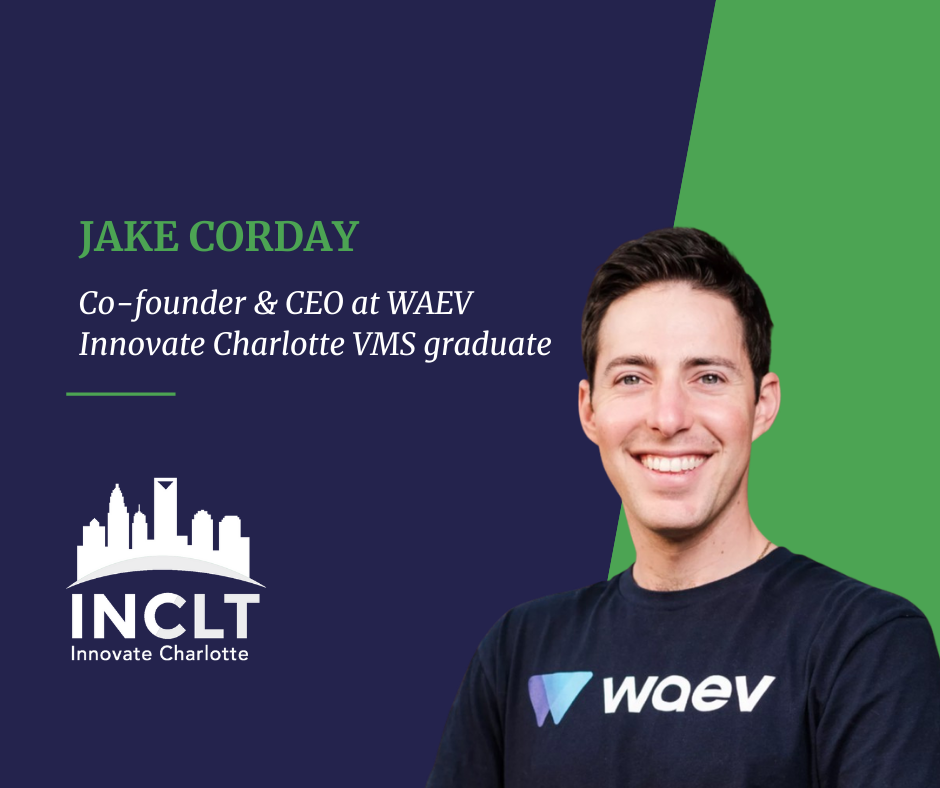
Throughout high school, his entrepreneurial spirit grew stronger as he learned how to program websites and leverage technology for local businesses. After graduating from the University of Florida, Corday returned to the Charlotte area to join a new startup who were in the process of growing their business. “As the tenth team member, it was a great opportunity to see firsthand what it looks like inside of a well-funded and rapidly growing startup.”
As a marketing major with a strong technology background, inspiration for Waev’s concept struck Corday one afternoon as he sat in a local restaurant. “There was a coaster in front of me that had Blue Moon advertised on it, and it suddenly struck me that these huge brands like Blue Moon, Bud Light, and Jack Daniels are all spending hundreds of millions of dollars to advertise on television, billboards, and social media, but at the point where the customer is actually ready to make their purchasing decision, their best marketing option is a stagnant relic that fails to capture attention in the digital age.”
From there, Corday’s wheels began turning. What if there was a way to create a dynamic, captivating, and ultimately more effective medium for marketing right within the restaurant or bar? And what if it not only allowed advertisers to promote their brand but also helped the restaurant or bar to highlight specials or high margin items to help inform a customers’ purchasing decision right at the point-of-sale?
In 2018, Waev officially launched its first suite of digital Waev displays in Charlotte. These in-venue communication platforms allocate 50% of its airtime to restaurant content and 50% of airtime to branding, engaging patrons throughout their visit.
Corday joined Innovate Charlotte’s Venture Mentoring program during what he calls a crossroads with his startup. “Early on we had opportunities in several different verticals, and I was seeking guidance on what we should be focusing on, and in what direction we should be steering the business,” Corday recalls.
He describes INCLT as a safe space to talk through the many decisions founders typically face on a daily basis, providing the much-needed structure so many startups struggle to navigate during their early stages. “One thing I’ve learned along the way is that mentorship is one of the most overlooked, yet critical pieces of the entrepreneurial journey,” Corday says, “INCLT does a great job of pairing the right mentors with the right entrepreneurs. The pairing process involves identifying mentors with industry experience relevant to your business, as well as identifying who you naturally click with on a personal level.”
Despite having graduated from the program, Corday maintains regular contact with his mentors. “I’ve formed friendships with my mentors, and their counsel remains tremendously beneficial to Waev.”
When asked what advice he’d give to others just starting out as a new founder or entrepreneur, Corday shares one word that has encompassed his personal journey: persistence. “I always refer back to Steve Jobs’ quote, ‘I’m convinced that about half of what separates the successful entrepreneurs from the non-successful ones is pure perseverance,’ and that has always spoke to me because I know the amount of roadblocks you can, and will, run into,” Corday explains, “But the ones determined to find their way over, around, or through them have the best chance of being successful.”
“It’s a very inspiring story that Jake shared, and it is exciting that he was able to find mentorship support from Innovate Charlotte at the right time on his entrepreneurial journey” said Olga Muller, CEO at Kepler Team.
Waev recently closed their seed round and is looking to add talented team members to their Charlotte-based team. For more information, visit their website to apply.
From TikTok to table
After graduating from NC State with a degree in business administration, Guyton spent several years working in industries ranging from automotive to IT. Food and nutrition were always more of a personal passion, but as he learned more about nutrition, he realized ‘clean eating’ wasn’t so simple. There was so much to learn, and it could be overwhelming.
He started helping out friends and family on an informal basis, developing workout routines and meal plans. Then, Guyton began sharing recipes and nutrition tips on TikTok. It was there he saw the opportunity to turn his passion for food into something more.
“Everyone was asking, ‘How do you do this?’ or ‘Can you do this for me?’” Guyton said. “I started thinking I could really do this for people.”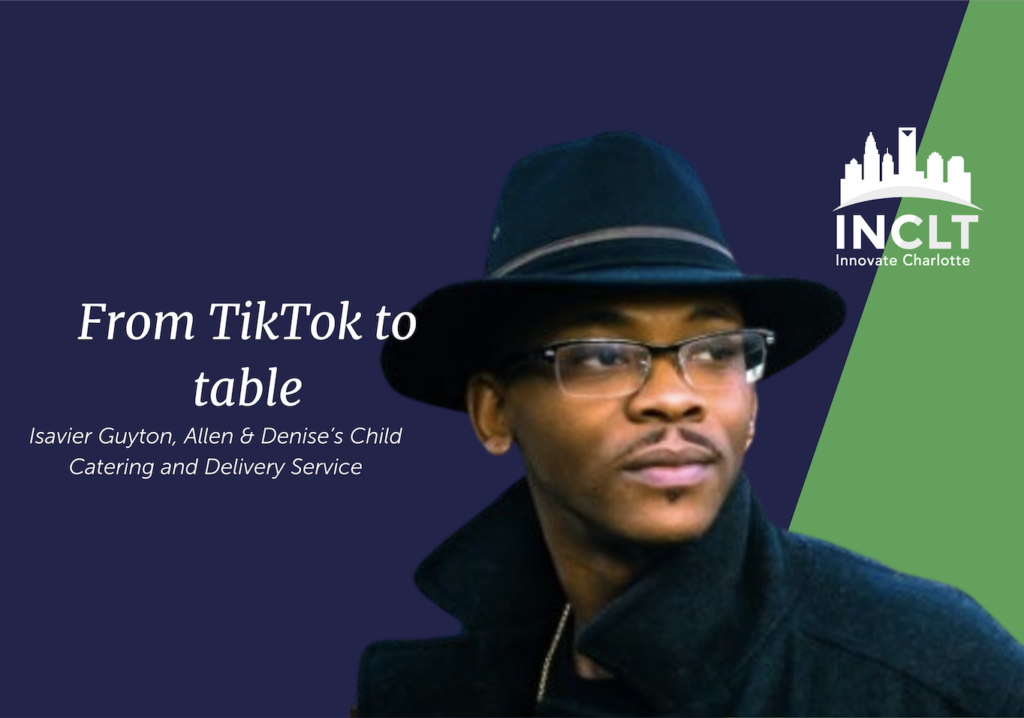
In October 2019, Guyton launched Allen & Denise’s Child Catering and Delivery Service. The name pays homage to his parents. He grew up with 13 brothers and sisters and wants to underscore the importance of those relationships in everything he does.
"Food is very comforting in a lot of ways for a lot of different individuals. It ties in with memories that we have with our loved ones and families. You usually congregate around food, and that’s the connection I wanted to make,” he said.
The business offers individual and group catering, customizable meal prep subscriptions and virtual cooking classes. Guyton’s goal is to put a tasty spin on healthy ingredients, and he enjoys the challenge of finding a way to help someone enjoy a food they think they don’t like — whether it’s zucchini hot dogs or split pea burgers.
“You can take things you may not like at all, and I’ll whip it for you. If I make it in a certain way, you're going to like it,” he said.
For skeptics, he recommends starting with his Mac & Twist, a cauliflower-based macaroni and cheese. That dish, he says, can sway anyone.
Guyton’s dream is to develop an authentic local following, build a team and further scale out Allen & Denise’s Child Catering and Delivery Service, which currently offers local delivery around Charlotte and national shipping. He sees INCLT as a way to gain valuable resources and connections to accomplish those goals.
“Innovate Charlotte seemed to be the perfect outlet to find individuals who are like-minded and can help you out along the way,” he said.
“It's amazing that mentorship at Innovate Charlotte is available not only to high stakes technology businesses, but also to founders who are building a company with a local impact such as Isavier” said Olga Muller, CEO at Kepler Team.
Building a big business out of nanoscopic molecules
Margaret Kocherga describes herself as an “accidental entrepreneur.”
Kocherga’s background is in academic scientific research, and it was her PhD advisor who first brought up an idea of a startup. She wasn’t familiar with the entrepreneurial world at that time.
“Maybe if I knew, I wouldn’t have done it,” she jokes.
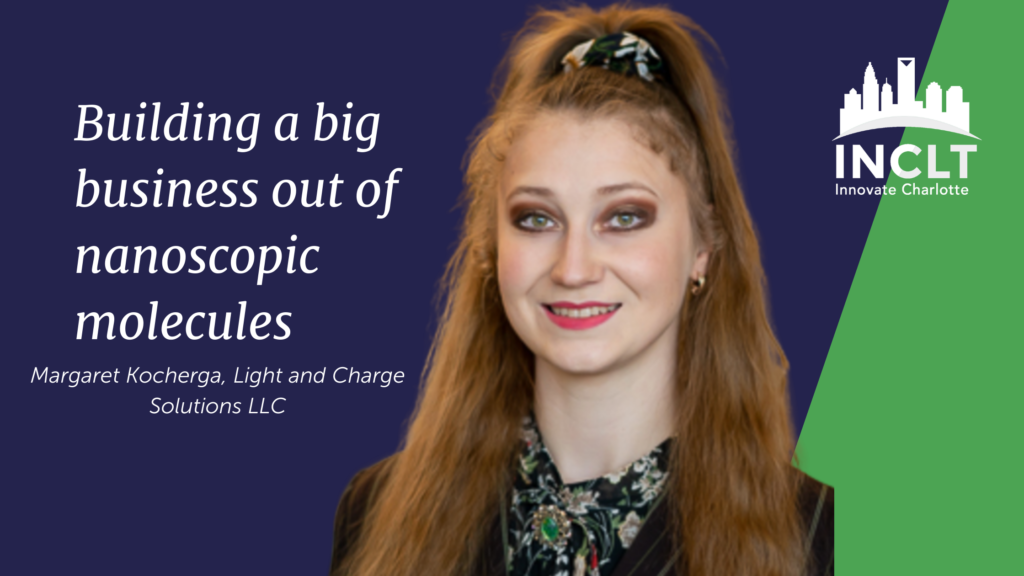 She must have done something right. Kocherga launched Light and Charge Solutions LLC in November 2019 after receiving a grant from the NC IDEA Foundation, and this winter, it was named among Charlotte Inno’s Startups to Watch in 2021.
She must have done something right. Kocherga launched Light and Charge Solutions LLC in November 2019 after receiving a grant from the NC IDEA Foundation, and this winter, it was named among Charlotte Inno’s Startups to Watch in 2021.
The company is working to develop materials for electronics that are better for the environment and take less time to manufacture. It is currently in a pilot stage and is working with potential customers to develop the technology. Kocherga’s ultimate goal is to be able to look at her phone or her car and say, “Hey, I make stuff for this.”
Kocherga is also participating in Chain Reaction Innovations through the U.S. Department of Energy’s Argonne National Laboratory in Illinois and splits her time between Chicago and Charlotte. As a result of the funding she received through that program, she was able to make the switch to becoming a full-time entrepreneur.
“You feel permanently unqualified to do everything that you’re doing,” Kocherga says of entrepreneurship. ”There’s always something that comes up. As soon as you learn one thing, you need to be learning the next thing, and the next thing, and the next thing. That’s the biggest thing: adjusting to not knowing what’s going to come next and learning to quickly act.”
She has also built a tough skin. Working in a male-dominated field, Kocherga often found herself as the sole woman in a room of 200 people. She says having female mentors to help guide her through those situations was one of the most helpful resources thus far. She also learned that standing out can be a good thing.
“I would see people two years after meeting them, and they would remember me. I would think, ‘How do you remember me? Oh, well, I’m the only one in the room. Of course they’re going to remember me. I’m the oddball of the party,’” she said.
Kocherga has also learned that having the right network of people around you is an important piece of successful entrepreneurship. INCLT’s mentorship program has proven to be a unique way to create those relationships and to learn more about what she doesn’t know.
“Maybe you have the right talent in your company, but you don’t really know how to utilize it. That's the next level. That’s something you can’t just learn by taking a class,” she said.
Stories like Margaret's are what make Charlotte’s entrepreneurial community so diverse. “I am very excited to see people from the Russian speaking community tapping into the mentorship networks of Charlotte.” said Olga Muller, CEO at Kepler Team.
Conversation with Innovate Charlotte’s New Executive Director
Back in November, Innovate Charlotte got a new executive director. You’re just hearing from him now because, for the past four months, Juan Garzón has been hard at work.
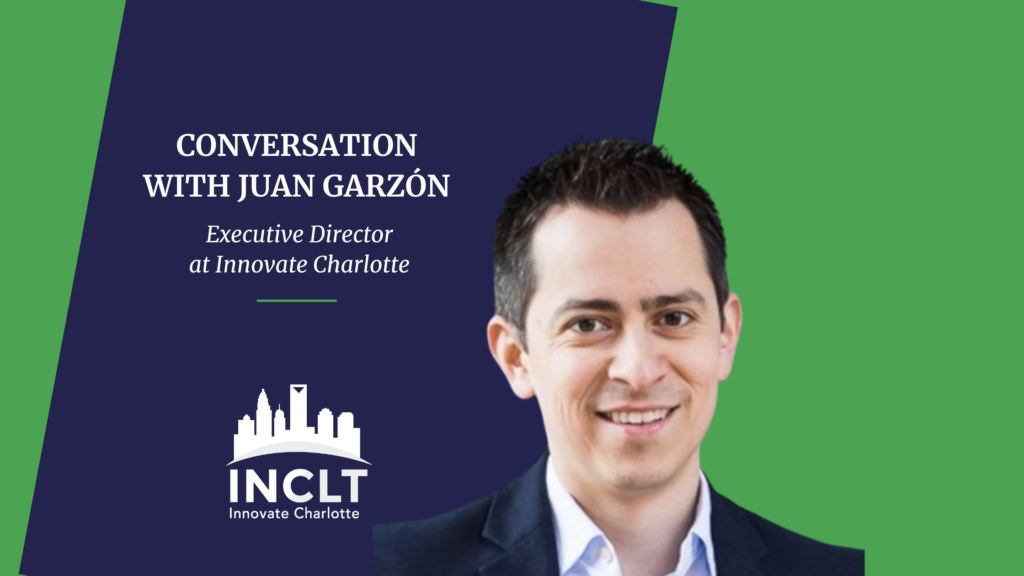
In a non-pandemic world, he would likely have been running from one coffee meeting to the next, adding in a few lunches, drinks and events throughout the week. In our current reality, he’s spent a lot of time on the phone and Zoom, asking local founders, leaders, and investors what works well at Innovate Charlotte — an organization founded to serve entrepreneurs and the entrepreneurial community in the Queen City — and what more there is to be done.
It’s the kind of work that has driven Garzón for years. He is the founder of the consulting firm The Garzón Company, and he has long begun client engagements with a needs assessment. The process is designed to understand the most pressing issues a company is facing so that Garzón can get to work on a solution. Now he’s doing the same at Innovate Charlotte: For the past few months, he’s been asking members of the entrepreneurial community what they need, and how Innovate Charlotte can help.
“We are in the process of finding opportunities and gaps and trying to turn the ship slowly in a direction that better serves our community,” Garzón said in a phone interview from his home, where he also serves as headmaster, lunch chef, and truant officer for his four children as they navigate the new homeschool normal. “The next step is to incorporate some of these changes and updates, and then we’ll start rolling out new programming and initiatives that I think will be very exciting for the community.”
A resume rich in ecosystem experience
Garzón’s involvement in Charlotte’s entrepreneurial community extends well beyond his role as founder of his own company. He is also the executive director of PitchBreakfast, a nonprofit organization that gives founders an opportunity to practice pitching their startups before an audience of investors and community leaders. He is also the founder of StartCharlotte, the predecessor publication to Charlotte Inno. When Charlotte Inno’s parent company acquired StartCharlotte, Garzón became general manager for Charlotte Inno and head of ecosystem development for Inno publications across the country.
He’s also no stranger to the work of Innovate Charlotte, particularly its signature program, the Venture Mentoring Service. He joined the cohort of leaders who traveled to MIT back in 2018 to learn the VMS methodology, and he’s been involved in various other ways throughout the history of the organization.
All that history and all that potential are coming together at the perfect time for Garzón and for Innovate Charlotte.
“Founders need a lot of support these days, with everything going on in the world, and it’s not just the usual connections to potential clients and investors and access to resources,” Garzón said. “It’s the emotional support of having someone who will listen to them. That could be connecting them to other founders or just listening to the challenges they’re having.”
It could also involve creating programs built around their most pressing needs, which is the inspiration behind the first three initiatives Garzón is planning for Innovate Charlotte.
A plan designed for ecosystem transformation
The first is an initiative he created back when he ran StartCharlotte. It’s called Intro to the Startup Community, and it will offer entrepreneurs and those interested in taking the plunge with a crash course in what Charlotte has to offer startups and their founders, from accelerator programs and coworking spaces to investment and networking opportunities.
The second initiative is to create a formalized navigator program, which would give entrepreneurs access to Garzón and other ecosystem leaders for 30-minute meetings designed to understand their needs and introduce them to the right resources within the community.
“It’s the kind of thing I’ve been doing over coffee meetings for years. Now, I want to formalize it and get more people involved,” Garzón said.
Other focus areas will include expanding the current office hours program, offering new educational opportunities to founders, and engaging corporate and other partners in the entrepreneurial ecosystem.
A goal centered on maximum impact
Just a few months into his role, Garzón has already come to understand the potential impact of that work.
“I spoke with one founder recently who expressed lots of stress and concern because of everything going on in the world and in the community, and just in that conversation, I realized how a few pieces of advice and connections to other people made a big difference to her,” Garzón said. “Those are the conversations I’ve always enjoyed throughout my career.”
And there is much more of that to come. Garzón hints at several recent conversations with ecosystem partners that could yield exciting new opportunities for local founders, in addition to what he has planned specifically for Innovate Charlotte. At the same time, the mentorship program will continue to be a powerful resource for the community.
“If you’re a founder, check us out. Apply to be part of our mentorship program on the Innovate Charlotte website, and sign up for our emails. If you’re an ecosystem support organization, let’s talk about how we can work together for the community,” Garzón said. “The need for connection, resources, help, and advice is higher now than it has been in a long time, which makes an organization like Innovate Charlotte that much more important.”
Kepler Team, a local software development startup, understands that need firsthand. “This past year has challenged all companies, but startups in particular,” said Olga Muller, CEO of Kepler Team. “We are already running lean, working toward the next big milestone, and any external challenge deals a significant blow. Having organizations like Innovate Charlotte that offer resources specifically designed for this community and our needs helps us feel supported and gives us a place to turn when we need it.”
If you’d like to get involved with Innovate Charlotte — as a mentor, a mentee or as an ecosystem partner — visit the Innovate Charlotte website today.
Inside one founder’s experience with the INCLT Venture Mentoring Service
By Mary Johnson, INCLT VMS Mentee
In building my business, my business has always come last.

It doesn’t make a lot of sense, when you think about it. If I want growth and scale in my venture, shouldn’t all my energy be focused on achieving those two goals?
The short answer is, yes. But it’s not that simple. I run a marketing agency called Brave New Word. We provide content strategy and creation for brands that are looking to make a statement, to become thought leaders in their respective fields, to be brave. And in pulling out all the stops to make our clients sound good, I routinely put Brave New Word last on my list of priorities.
I know that’s the wrong approach, and yet I also know I’m not alone. Entrepreneurs and small business owners are told this all the time: If you want to grow, you’ve got to work in the business less and on the business more. Figuring out how to do that has always been the challenge.
If I have learned anything about myself over the past three-plus years as an entrepreneur (and a dozen or so more in journalism), it is this: I need deadlines and accountability to get anything done. And so it would stand to reason that I need some external force holding my feet to the fire when it comes to putting my business first.
Enter the Innovate Charlotte Venture Mentoring Service.
In the spirit of full disclosure, I’ve come into the INCLT with more than a cursory understanding of the process. For the past few years, I’ve been writing about its efforts, recounting for the broader entrepreneurial ecosystem in Charlotte the impact a team of skilled, seasoned mentors can have on a fledgling organization. And at first, I didn’t think it was for me. I’ve always thought mentorship works best when the mentor/mentee relationship takes shape organically — when you just-so-happen to meet someone who takes a liking to you and your business and offers his or her wisdom for free. I’ve also steered away from situations that promise to put more work on my plate. Most weeks and months, I’m drowning. Do I really need someone else telling me what else I should be doing?
But 2020 had a way of pushing me, and most others I know, out of our comfort zones. I knew I wanted more from my business. I knew I needed help, and I knew I didn’t want to wait for fate to put the perfect mentor in my lap. So I applied and, a few weeks later, found myself on a Zoom call with four mentors who wanted to know more about Brave New Word.
The process of putting words around what you’re struggling with is powerful — the process of talking about your goals and big ideas, even more so. And that’s what I found myself doing in that first call. It was part therapy session and part business dissection. The mentors took turns asking probing questions about revenue streams and clients, pricing and services. They asked what was weighing me down and what got me fired up. They asked me to paint a picture of my perfect day in the business — and then challenged me to break down what it would take to bring that day to life.
When you sign up for the INCLT mentorship program, you don’t choose your mentors; your mentors choose you, based on your business, your challenges and your goals. I had no idea what to expect in that first meeting, and yet I found myself pleasantly surprised at the outpouring of support, the pats on the back, the offers to provide more guidance in particular areas. I’m highly critical of myself — a quality I’ve often considered the secret behind much of what I’ve achieved — but my mentors took a decidedly different approach. They wanted to celebrate my wins as much as they wanted to pinpoint the work that still needs to be done.
I walked away from that first meeting inspired, with a renewed commitment to dig in and focus on the business. I had a long list of to-do’s, which my mentors quickly walked back to a much more manageable list of two key deliverables for the next time we met. I had no doubt I could carve out the time to give them the effort they were due.
Then, I went back to my day to day — and those deliverables once again fell to the bottom of my list.
That’s right: All that inspiration meant nothing when the realities of life as an overworked entrepreneur (and wife and mom of two small kids and dog parent) once again settled over me. And isn’t that so often the case? We read that motivational quote or that bestselling self-help book, and we resolve to be and do better. But without accountability, our best laid plans fall flat. At least they do for me. I’m only as good as the people who are keeping me honest.
While I fell off the wagon and focused solely on my clients for the next three weeks, the approach of my next mentor meeting snapped me back to reality. I knew I was facing another Zoom call with four experienced, busy leaders who were carving out an hour and a half of their day to make me and my business stronger. I couldn’t show up empty handed.
So I found the time. I carved out a few hours to give my homework assignments real, intentional brain power. And when my second meeting rolled around, I was ready. More than that, the work I did has legs. It has the potential to focus and hone my business, my client base and our approach to the work we take on. And quite simply, it would not have happened without my mentors — at least not any time soon.
When you sign up for the INCLT mentorship program, you commit to the program for a year. Some companies stay in it even longer than that, and I can see why. It’s not just the expertise and experience you can leverage; it’s the accountability, the sounding board, the team of people who want the best for you and understand that the path there requires a push to focus on you.
I’m ready for the next step in my business, and I know I can’t get there alone. Now I don’t have to.
Stories like Mary’s are what make Charlotte’s entrepreneurial community so strong. It’s an ecosystem built on helping each other in the interest of helping the community as a whole. “All the research shows how important mentorship is to people at all stages of their careers, and founders are no exception. If we want them to succeed, we’ve got to invest in their professional development, starting now,” said Olga Muller, CEO at Kepler Team.
INCLT is looking for more founders and mentors to do just that. If you’re an organization in need of help, apply. If you’re a business leader looking to give of your time and expertise, become a mentor today.
McKinsey provides support to INCLT mentees
The Day of Service is a company-wide initiative at McKinsey in which employees are given opportunities to make a positive impact. There are inspirational speakers, volunteer opportunities in their local communities and chances to learn from those creating meaningful change around the world.
McKinsey chose INCLT as one of the recipients of that service, specifically two participants in the INCLT Venture Mentoring Service: Kevin Giriunas, who owns Advent Coworking, and Wendy Hickey, the founder of ArtPop Street Gallery. Both have been long-time mentees, working intimately with their mentor teams and using their experience, knowledge and advice to make better informed decisions as entrepreneurs.
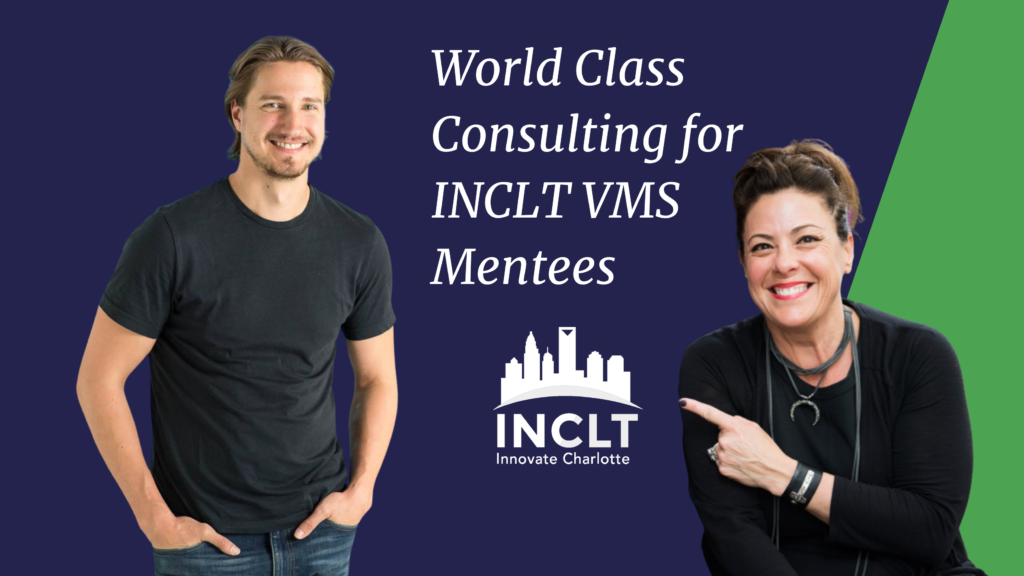
For Giriunas, his mentors have helped him make data-driven decisions and organize his finances. He said they have also been helpful in navigating the chaos of running a coworking space amid a global pandemic.
For Hickey, her mentors have helped her navigate ArtPop Street Gallery’s long-term success, creating a strategic, five-year plan and helping her meet her goal of three years of organizational sustainability.
Given the success they’ve had with mentorship so far, both Giriunas and Hickey were excited to speak with outside consultants at McKinsey and hear their perspective on how they can amplify their efforts.
“They have zero skin in the game,” Giriunas said. “They don’t know who I am, so it’s a fresh set of eyes on some of the problems and ideas. It adds a different perspective to the mix.”
INCLT mentor Mark Steinman agreed this fresh set of eyes from a completely unbiased perspective was a unique opportunity for the mentees.
“Not only did they get the chance to hear different ideas, but they were also able to receive validation of their current approaches,” Steinman said.
Before the session, the consultants asked Giriunas and Hickey to provide a problem statement outlining the current state of their venture, the desired future state and any gaps between the two.
After a particularly unprecedented and challenging year, Giriunas was most focused on finding a way to increase his revenue back to where it was pre-COVID-19. In response, the consultants advised Giriunas on what to focus on — and what to avoid — amid a time of uncertainty. Specifically, they cautioned him that not all of his ideas for potential revenue streams will make sense after the pandemic. Right now, long-term planning can wait. Instead, they advised, he focus on the short term.
“I felt oddly reassured and calmed afterward,” Giriunas said. “Several of the individuals said I need to focus on the next six months from now — and know that the next six months are still going to be very challenging financially. But there is hope on the horizon.”
The consultants also advised Giriunas on the next logical step for a new market he plans to tap into. While he had already discussed it with his mentors, hearing it from an outside perspective gave him the extra push to get started.
That outside perspective also provided meaningful insight and an extra push for Hickey, whose primary focus was to figure out a strategy for ArtPop Street Gallery’s corporate partnerships. Hickey was able to obtain high-level ideas on target markets that she could connect with and insight into exactly what companies in those markets would look for in a nonprofit to support.
“With their huge portfolio, being an international company connected to companies all over the world, we wanted to know what they are seeing in the world of corporate partnerships and if they had suggestions of how we can improve our corporate partnership offerings,” Hickey said.
When one consultant in the session was puzzled by the nonprofit’s mission and goals, it was a wake-up call for Hickey to refine ArtPop Street Gallery’s message. If one consultant didn’t understand it, she said, there could be others in major companies who don’t understand it, either.
“He was so helpful at making sure that was clear at inception so that we didn’t come across someone like him and they don’t know what we’re doing,” Hickey said. “We’re already working on fine-tuning our corporate partnership packaging, taking that advice of getting crystal clear on our message.”
Hickey’s goal of creating meaningful relationships also came to fruition on the call, as two consultants with interest in the arts mentioned they were willing to spend some additional time with Hickey to provide support beyond the conference call.
Participating consultants were impressed with their sessions with both Giriunas and Hickey. But what stood out was the entrepreneurs’ commitment at the local level.
“The entrepreneurs we spoke with displayed passion for their work and a true focus on building the community in Charlotte,” Harrison said.
For Giriunas and Hickey, these sessions left them feeling motivated, with action plans to move forward.
Beyond the direct impact on local founders, the interest McKinsey has shown in Charlotte’s entrepreneurial ecosystem is a sign of the growth and impact this community has achieved in recent years, said Olga Muller director of operations for local software development company Kepler Team. “I have been part of the Charlotte startup community at every stage of its development, and this interest from a global organization like McKinsey confirms what we already know: Now is a fantastic time to be an entrepreneur in the Queen City.”
For more information on the INCLT Venture Mentoring Service, visit our website. We are currently accepting applications for both mentors and founders looking for guidance. Apply today!
From hopeless to hopeful: An INCLT Pivot Story
At the beginning of the pandemic, “survive” was the word on everyone’s minds.
Six months later, we now know survival isn’t enough. We must rethink our old ways of doing business. We must pivot.
That doesn’t mean the process of shifting course is easy. That’s why INCLT is sharing the stories of local entrepreneurs who have been forced to change their fundamental business models. We want to shed light on the transformation process and the role mentorship can play.
Last month, we told the story of Macie Mata, former founder of MAZE Services. This month, we interviewed Samie and Ryan Roberts, the husband-and-wife team behind Charlotte-based startup Bustld, which makes the wedding planning process easier for both couples and vendors.
The startup launched in 2016 after Samie, a wedding planner, worked with a client who wasn’t the right fit. The wedding itself had been a success, but Samie wanted to find a better way to serve both sides of the wedding marketplace so that couples could find the right vendors to bring their dream weddings to life. Her husband and co-founder, Ryan, brought his data and technology background, as well as his entrepreneurial spirit, to the conversation and got to work figuring out the analytics and algorithms to take the idea from concept to reality.
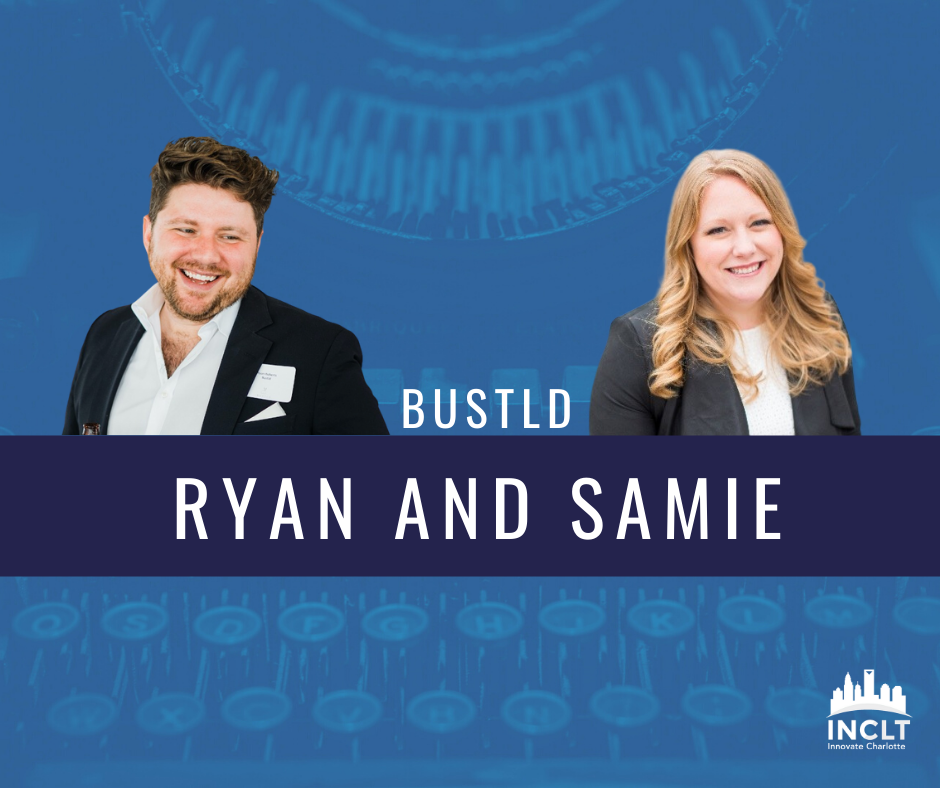
The result was Bustld, and it wasn’t long before the business had gained traction in Charlotte. That inspired Samie and Ryan to expand their services to Raleigh in 2017. After more than 100 people attended their Raleigh launch party, the two knew they were onto something big. Then, in 2019, they joined the INCLT Venture Mentoring Service.
“One thing that’s missing when you’re bootstrapping is the guidance that you can get from your investor,” Ryan said. “We were in our own little bubble, but to get that outside perspective is incredibly powerful. Innovate Charlotte allowed us to get that level of mentorship without the financial obligations or bias that an investor can bring. Especially when you come from corporate, you remember what it’s like to have access to everything — an HR department, a financial department, accounting and sales department, leadership and all these different things. [When you’re a startup], it’s really just a handful of us. It helps to have that guidance.”
With the INCLT mentorship program, that guidance comes from a team of mentors, which has provided significant value for Bustld as it has grown.
“Having multiple perspectives is really nice because everybody comes with their own perspective of what their work life is like and what they’ve done in their past, and they can provide us that insight,” Samie said. “It’s nice to hear different things and take that back and use that information to make our own decisions.”
Samie and Ryan’s mentors have helped them consider possibilities and ask questions they may not have thought of before to make more informed decisions. The mentors also helped the two network with other INCLT mentors and local business owners. In February 2020, just over a year after the couple joined the INCLT Venture Mentoring Service, Bustld saw its most successful month in the history of the company.
Then, the pandemic hit, and widespread panic ensued. States across the U.S. went under lockdown. Paper towels flew off the shelves, and hand sanitizer was out of stock online. But it didn’t become real to Samie and Ryan until weddings started to get postponed and then flat-out cancelled.
“It was really scary,” Samie said. “We only had this one product, and it’s all based on wedding vendors. We started throwing around all these different ideas of what we could do to generate money and keep the business moving, given the state of weddings.”
Samie and Ryan put together a long list of ideas — one that included concepts like Bustld merchandise and a “wedding-in-a-box” concept — and brought that list to their mentors. Their mentors then helped them refocus their efforts and advised the two to pick one idea out of the many.
The question was, which one had the most potential? As the couple debated, INCLT Executive Director Keith Luedeman stepped in to offer his perspective: virtual weddings.
“He kept texting us both, telling us that we had to do virtual weddings,” Ryan said with a laugh. “Samie and I, being the romantics of weddings, were like, ‘No. We don’t like that.’”
The founders had seen the challenges that came with Zoom weddings: issues downloading the app, problems logging on, bad WiFi connections and an overall loss of the magic that comes with a wedding day. They knew what didn’t work, and they started to wonder, what could?
“At that point, we thought, ‘We don’t like it, but we’re going to figure it out. But it can’t be Zoom,’” Ryan said.
Ryan started researching and reaching out to different producers at ESPN and NASCAR to explore how virtual weddings could happen without standard video conferencing software and offer couples the same special experience of a wedding.
The result of all that research and repositioning became LoveStream, a new product that turned Busltd’s romantic founders from hopeless to hopeful.
LoveStream allows guests to stream weddings from any device just by clicking a link — no apps required. To get the footage, the bride and groom set up their phones on tripods, and Bustld takes over to control the camera angles and add slideshows, videos and music to give guests the full wedding experience from their screens. A live chat feature is available for guests to offer congratulations. Every couple gets their own wedding website, which includes the wedding video, a virtual guestbook and more. And the video is available on demand, which means guests in different countries and time zones are able to watch the wedding when it is convenient for them.
“It was so important to make it easy,” Samie said.
While April and May were tough months for Bustld, LoveStream reignited the spark in the company. In August, as a global pandemic continued to batter the wedding industry, Bustld celebrated its most successful month to date.
Looking ahead, Samie and Ryan are confident virtual weddings are here to stay as an important component of planning a wedding.
“It’s not going to have the same growth trajectory that it has now, but it’s going to be one of those things where you have a photographer, you have a caterer, and you have a livestream,” Ryan said.
Now, Ryan and Samie’s mentors are challenging them to look ahead and prepare their team for the new roles that have come with the pandemic. As the company continues to grow, it helps to know there is a group of mentors guiding them and cheering them on through their success.
“Having someone who is unbiased, who truly just wants what's best for us and guides us there is just so important,” Samie said. “I feel so grateful that we have found that in our mentor team.”
Creating opportunities for collaboration and guidance is core to INCLT’s mission, and it’s a critical part of building a more robust entrepreneurial ecosystem. Olga Muller, director of operations for local software development company Kepler Team, has seen that firsthand, both as part of a startup and as a member of the broader entrepreneurial community in Charlotte. “No business or founder can succeed in isolation. Success requires a collaborative approach and help from those who have been there and done that when it comes starting and building companies.
To learn more about Innovate Charlotte and how you can get involved, visit www.inclt.org.
Finding beauty in the pivot
In many ways, “pivot” has become the defining word of the pandemic.
We’ve had to pivot the way we parent, the way we work, the way we learn, the way we lead. While change has always been constant, it has never — at least in our lifetime — been so rapid and so intense.
But, while larger companies have struggled to embrace that change, entrepreneurs have been uniquely suited to the challenge. Pivoting is par for the course for the vast majority of startups. That doesn’t mean it’s easy. Ideas are like babies. When you have one, it can be hard to see its flaws. That’s why INCLT is beginning this series of conversations with local entrepreneurs to break down the process of changing your fundamental business model and the role mentorship can play in the process.
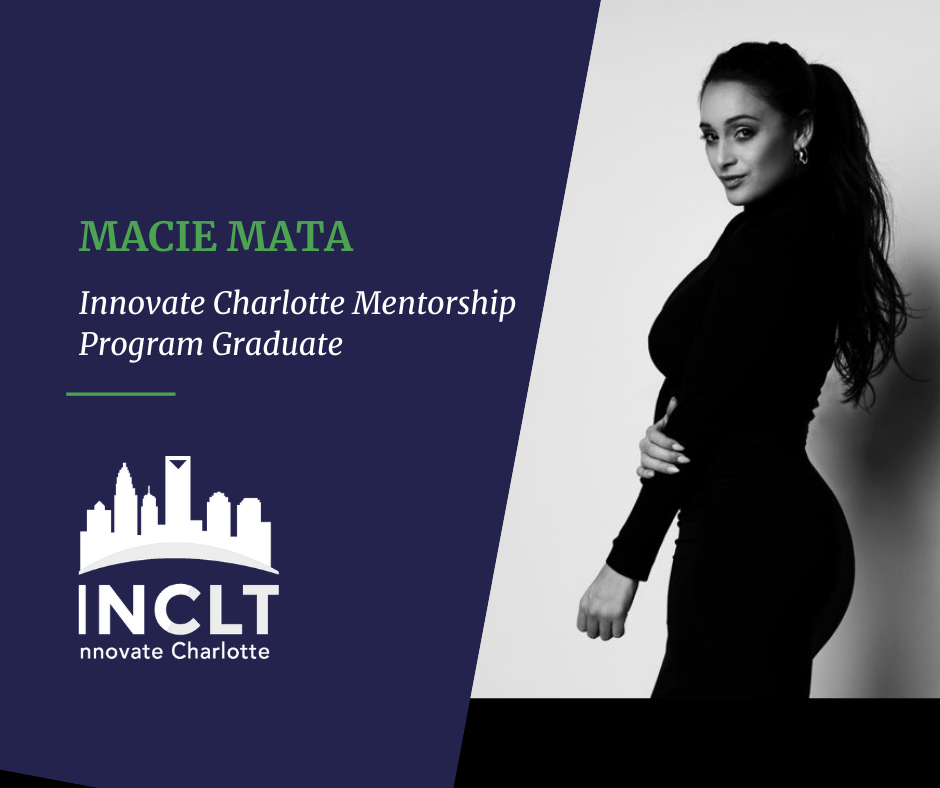
First on our list is Macie Mata, the former co-founder of MAZE Services and Curl Lounge. Mata joined the INCLT Venture Mentoring Service in the thick of building MAZE, a mobile beauty concept that brought hair stylists, manicurists and other beauty professionals straight to the client, whether they were at home or the office. It was born out of a very real problem Mata had encountered as her finance career took her across the country, forcing her to abandon relationships with professionals she liked and trusted. She and her co-founder, Samonica Ngo, had been building the platform and the business behind it. They had gone through what Mata jokingly calls a “dummy round” of fundraising (during which they raised nothing), and they realized it was time to come up for air — to get plugged into the Charlotte startup community, to get more educated on fundraising and to get help.
“We were right around beta phase when we decided to join INCLT. We had our heads down for so long building this technology and doing case studies and research, and it was time to resurface and look around,” Mata said. “We needed to dive right into this startup community and surround ourselves with people who challenge our thought processes. We had been so embedded in our business, we knew we needed someone from the outside looking in.”
Mata is one of those people who welcomes feedback. She craves it and credits it with helping her build a successful career in finance. But feedback on your business is different. It hits harder, and as a result, she describes her relationship with her group of INCLT mentors as “a love/hate relationship.” Her mentors asked tough questions that forced her to rethink aspects of her vision. More than once, she and Ngo would leave mentor meetings fired up and frustrated.
“But the majority of the time, our mentors were right. I might not have wanted to hear what they had to say, but I realized pretty quickly that it was something I needed to look into,” Mata recalled. “You should always want to have someone on the sidelines who you can go to with questions. I believe so much in the mentorship program because of all the things they did to challenge us.”
And it was working. Mata and Ngo went in pursuit of a seed round and soon found themselves in negotiations to raise $350,000.
“We were ahead of schedule, so we decided to hold off on the funds. For one, if we were to hit these awesome milestones, we knew it would give us more negotiating power in a few months. Two, we were informed that we were breaking the law,” she said.
In North Carolina, each cosmetology license must be tagged to a salon location so the state Board of Cosmetic Art Examiners can ensure all necessary procedures are followed. The license cannot be mobilized, meaning that hair stylists, manicurists and other beauty professionals can’t take their services on the road, unless it’s to serve someone with a special need. Mata can laugh about it now, but at the time, that realization posed a very real threat to the business she wanted to scale, fast. Overnight, she went from founder and CEO to lobbyist, fighting in Raleigh to change the law that stood in the way of MAZE’s success.
“This is an industry that needs to change and needs to be disrupted, but the process to get a bill passed is pretty brutal. At that point, the burnout was different for me. Every entrepreneur experiences burnout, but it was draining my passion,” Mata said. “I’m not a lobbyist. I wanted to build this company and scale it. This put my scaling model from five years to 10, and it was no longer intriguing to my team or my investors.”
Mata and Ngo started hashing through options for the business.
“Our mentors were a huge part of this. We went through multiple ways to pivot our company, to see if it was something to pivot into something else in the beauty industry or a completely different vertical — and then what is the right dollar amount for us to walk away,” Mata recalled.
In the end, they decided to shutter MAZE and sell the technology they had built to a couple in Canada, where it’s being used in a completely different industry.
“In those moments, we were moving so quickly that my emotions were removed,” Mata said. “We voted on it, and we felt good about it. A few months after it was over is when I started having this extreme identity crisis. This was my identity for the past two and a half years. What is next?”
For Mata, it was a new business — a salon concept called Curl Lounge focused specifically for women with curly hair. The idea was to franchise the business from the start, allowing it to scale with speed. Mata raised $350,000 within the first 30 days. She pitched it to her mentors, who agreed to help her through the process. She was in negotiations on a lease for her debut space.
Then, the pandemic hit.
“That’s where I’m not alone in saying things got a little weird,” she said. “But in the end, it was almost a blessing. I was going through some initial growing pains of trying to find the right business partner or co-founder, and I had some really high expectations. Also, this was a very specific target market. It was a curly-hair salon, and I don’t have curly hair. As much as I believed in the mission and that this demographic deserved this type of diversity in the space, it would be 10 times harder for me to represent that brand.”
Before anything was signed, Mata decided to give the money she had raised back to her investor. Once again, she was an entrepreneur without a startup. But she didn’t stop working.
Mata believes there are many more businesses in her future. It’s part of her entrepreneurial mindset and drive. She thinks in business ideas, beyond the beauty space, and it began almost immediately after she shuttered the salon concept.
For one, she started working with other founders who were involved in the fundraising process, helping with due diligence and investor connections. In the past year, she’s helped startups raise $5.5 million.
She has also ventured out into the real estate space. Mata and her new business partner are building 14 townhomes that will become workforce housing. She’s also interested in affordable housing, and she’s contemplating the creation of a real estate fund in the Queen City that will focus on both.
“The community impact is really what we get the most excited about. Being able to provide this type of product and do it well is what we want to become great at,” Mata said.
She left the INCLT mentorship program after the salon concept fell through — the program requires founders to have a business concept in progress — but she came away with an ongoing mentor relationship, ironically enough with one of the mentors who challenged her the most.
“He became an individual mentor to me, and he’s brought extreme value because I'm all over the place,” Mata said. “He’s still challenging me to see what’s most important to me, and when I figure out what that is, we can dig deep on these specific projects.”
Now, she’s paying that forward.
“I am now mentoring two different people a quarter,” Mata said. “I let them know, ‘You have three months. What are your goals, and what do you want to learn?’” That commitment keeps the cycle going, and it helps keep Charlotte’s startup community growing, in powerful ways. Olga Muller, director of operations for local software development company Kepler Team, has seen that firsthand, both as part of a startup and as a member of the broader entrepreneurial ecosystem in Charlotte. “No business or founder can succeed in isolation. Success requires a collaborative approach and help from those who have been there and done that when it comes starting and building companies.”
